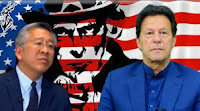The resolution, on which Algeria also voted no and Guyana abstained, called for an immediate and sustained ceasefire lasting roughly six weeks that would protect civilians and allow for the delivery of humanitarian assistance. Eleven of the 15 council members voted for the resolution, but the Russia and China vetoes stopped its passage.
The council will meet at 1400 GMT on Saturday to vote on an alternative resolution drafted by elected members of the Security Council, diplomats said.
That resolution demands an immediate ceasefire for the current Muslim holy month of Ramadan, the release of all hostages and an expanded flow of humanitarian assistance to Gaza.
The draft does not include provisions supporting ongoing diplomatic efforts to secure a ceasefire - an element of the US resolution. Washington has been working with Qatar and Egypt to try to broker a deal.
Friday was the first time Washington had backed a text that came up for a vote with the word "ceasefire" in it during the war in Gaza, reflecting a toughening of the Biden administration's stance toward Israel.
Earlier in the five-month-old war, the US was averse to the word ceasefire and vetoed measures that included calls for an immediate ceasefire.
"The vast majority of this council voted in favor of this resolution, but unfortunately Russia and China decided to exercise its veto," US Ambassador to the United Nations Linda Thomas-Greenfield told the Security Council.
She accused Russia and China of vetoing the resolution for cynical and petty reasons. She said they opposed it simply because it was penned by the US and criticized both countries for not condemning Hamas's October 07 attack on Israel.
"For all the fiery rhetoric, we all know that Russia and China are not doing anything diplomatically to advance a lasting peace or to meaningfully contribute to the humanitarian response effort," she told the council after the vote.
The US has wanted any Security Council support for a ceasefire to be linked to the release of hostages held by Hamas in Gaza. Palestinian Hamas fighters killed 1,200 people and took 253 captive in their Oct. 7 attack, Israel has said.
Nearly 32,000 Palestinians have been killed in Israel's subsequent offensive in the Gaza Strip, according to health authorities in the Hamas-ruled enclave.
Russia's ambassador to the UN, Vassily Nebenzia, said the US-led resolution was exceedingly politicized and contained an effective green light for Israel to mount a military operation in Rafah, a city on the southern tip of the Gaza Strip where more than half of the enclave's 2.3 million residents have been sheltering in makeshift tents.
"This would free the hands of Israel and it would result in all of Gaza and its entire population having to face destruction, devastation, or expulsion," Nebenzia told the meeting.
China's UN ambassador, Zhang Jun, criticized the text proposed by the US for not clearly stating its opposition to a planned military operation by Israel in Rafah, which he said could lead to severe consequences. He said Beijing also supported the alternative.
But Thomas-Greenfield said that measure fell short.
"In its current form, that text fails to support sensitive diplomacy in the region. Worse ... it could actually give Hamas an excuse to walk away from the deal on the table," she said.
French President Emmanuel Macron said on Friday that his country would work with Jordan and the United Arab Emirates to persuade Russia and China to back yet another alternative resolution at the United Nations for a ceasefire in Gaza.







